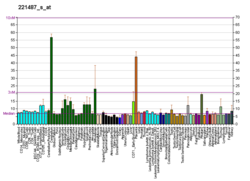ENSA (gene)
 From Wikipedia - Reading time: 6 min
From Wikipedia - Reading time: 6 min
Alpha-endosulfine is a protein that in humans is encoded by the ENSA gene.[5][6]
The protein encoded by this gene belongs to a highly conserved cAMP-regulated phosphoprotein (ARPP) family. This protein was identified as an endogenous ligand for the sulfonylurea receptor, ABCC8/SUR1. ABCC8 is the regulatory subunit of the ATP-sensitive potassium (KATP) channel, which is located on the plasma membrane of pancreatic beta cells and plays a key role in the control of insulin release from pancreatic beta cells. This protein is thought to be an endogenous regulator of KATP channels. In vitro studies have demonstrated that this protein modulates insulin secretion through the interaction with KATP channel, and this gene has been proposed as a candidate gene for type 2 diabetes. At least eight alternatively spliced transcript variants encoding distinct isoforms have been observed.[6]
References
[edit]- ^ a b c GRCh38: Ensembl release 89: ENSG00000143420 – Ensembl, May 2017
- ^ a b c GRCm38: Ensembl release 89: ENSMUSG00000038619 – Ensembl, May 2017
- ^ "Human PubMed Reference:". National Center for Biotechnology Information, U.S. National Library of Medicine.
- ^ "Mouse PubMed Reference:". National Center for Biotechnology Information, U.S. National Library of Medicine.
- ^ Heron L, Virsolvy A, Peyrollier K, Gribble FM, Le Cam A, Ashcroft FM, Bataille D (Aug 1998). "Human α-endosulfine, a possible regulator of sulfonylurea-sensitive KATP channel: Molecular cloning, expression and biological properties". Proc Natl Acad Sci U S A. 95 (14): 8387–91. Bibcode:1998PNAS...95.8387H. doi:10.1073/pnas.95.14.8387. PMC 20985. PMID 9653196.
- ^ a b "Entrez Gene: ENSA endosulfine alpha".
Further reading
[edit]- Bonaldo MF, Lennon G, Soares MB (1997). "Normalization and subtraction: two approaches to facilitate gene discovery". Genome Res. 6 (9): 791–806. doi:10.1101/gr.6.9.791. PMID 8889548.
- Héron L, Virsolvy A, Apiou F, Le Cam A, Bataille D (1999). "Isolation, characterization, and chromosomal localization of the human ENSA gene that encodes alpha-endosulfine, a regulator of beta-cell K(ATP) channels". Diabetes. 48 (9): 1873–6. doi:10.2337/diabetes.48.9.1873. PMID 10480622.
- Zhang QH, Ye M, Wu XY, Ren SX, Zhao M, Zhao CJ, Fu G, Shen Y, Fan HY (2001). "Cloning and Functional Analysis of cDNAs with Open Reading Frames for 300 Previously Undefined Genes Expressed in CD34+ Hematopoietic Stem/Progenitor Cells". Genome Res. 10 (10): 1546–60. doi:10.1101/gr.140200. PMC 310934. PMID 11042152.
- Kim SH, Lubec G (2002). "Decreased alpha-endosulfine, an endogenous regulator of ATP-sensitive potassium channels, in brains from adult Down syndrome patients". Protein Expression in Down Syndrome Brain. pp. 1–9. doi:10.1007/978-3-7091-6262-0_1. ISBN 978-3-211-83704-7. PMID 11771735.
{{cite book}}:|journal=ignored (help) - Strausberg RL, Feingold EA, Grouse LH, Derge JG, Klausner RD, Collins FS, Wagner L, Shenmen CM, Schuler GD (2003). "Generation and initial analysis of more than 15,000 full-length human and mouse cDNA sequences". Proc. Natl. Acad. Sci. U.S.A. 99 (26): 16899–903. Bibcode:2002PNAS...9916899M. doi:10.1073/pnas.242603899. PMC 139241. PMID 12477932.
- Bataille D (2003). "Endosulfines: Novel regulators of insulin secretion". Drug News Perspect. 13 (8): 453–62. PMID 12937617.
- Ota T, Suzuki Y, Nishikawa T, Otsuki T, Sugiyama T, Irie R, Wakamatsu A, Hayashi K, Sato H (2004). "Complete sequencing and characterization of 21,243 full-length human cDNAs". Nat. Genet. 36 (1): 40–5. doi:10.1038/ng1285. PMID 14702039.
- Wang H, Craig RL, Schay J, Chu W, Das SK, Zhang Z, Elbein SC (2004). "Alpha-endosulfine, a positional and functional candidate gene for type 2 diabetes: molecular screening, association studies, and role in reduced insulin secretion". Mol. Genet. Metab. 81 (1): 9–15. doi:10.1016/j.ymgme.2003.08.003. PMID 14728986.
- Thameem F, Farook VS, Yang X, Lee YH, Permana PA, Bogardus C, Prochazka M (2004). "The transcribed endosulfine alpha gene is located within a type 2 diabetes-linked region on 1q: sequence and expression analysis in Pima Indians". Mol. Genet. Metab. 81 (1): 16–21. doi:10.1016/j.ymgme.2003.09.013. PMID 14728987.
- Gabrielsson BG, Karlsson AC, Lönn M, Olofsson LE, Johansson JM, Torgerson JS, Sjöström L, Carlsson B, Edén S (2004). "Molecular characterization of a local sulfonylurea system in human adipose tissue". Mol. Cell. Biochem. 258 (1–2): 65–71. doi:10.1023/B:MCBI.0000012837.11847.c8. PMID 15030171. S2CID 22988098.
- Gerhard DS, Wagner L, Feingold EA, Shenmen CM, Grouse LH, Schuler G, Klein SL, Old S, Rasooly R (2004). "The Status, Quality, and Expansion of the NIH Full-Length cDNA Project: The Mammalian Gene Collection (MGC)". Genome Res. 14 (10B): 2121–7. doi:10.1101/gr.2596504. PMC 528928. PMID 15489334.
- Olsen JV, Blagoev B, Gnad F, Macek B, Kumar C, Mortensen P, Mann M (2006). "Global, in vivo, and site-specific phosphorylation dynamics in signaling networks". Cell. 127 (3): 635–48. doi:10.1016/j.cell.2006.09.026. PMID 17081983. S2CID 7827573.
- Ewing RM, Chu P, Elisma F, Li H, Taylor P, Climie S, McBroom-Cerajewski L, Robinson MD, O'Connor L (2007). "Large-scale mapping of human protein–protein interactions by mass spectrometry". Mol. Syst. Biol. 3 (1): 89. doi:10.1038/msb4100134. PMC 1847948. PMID 17353931.
 KSF
KSF





